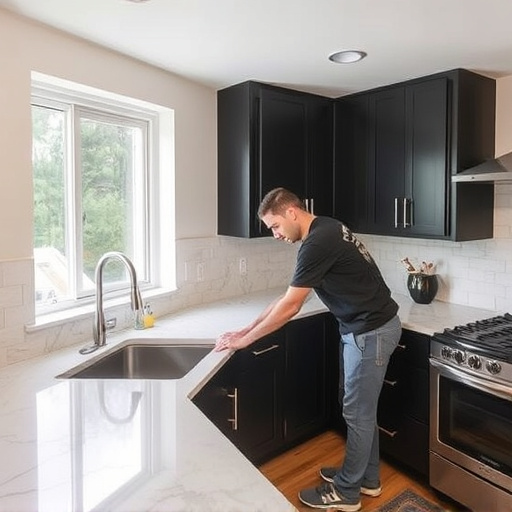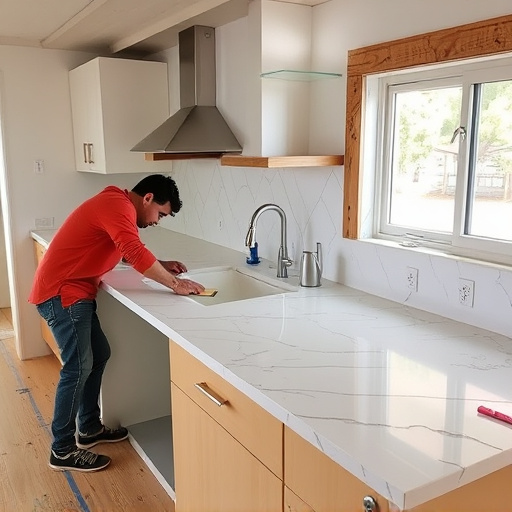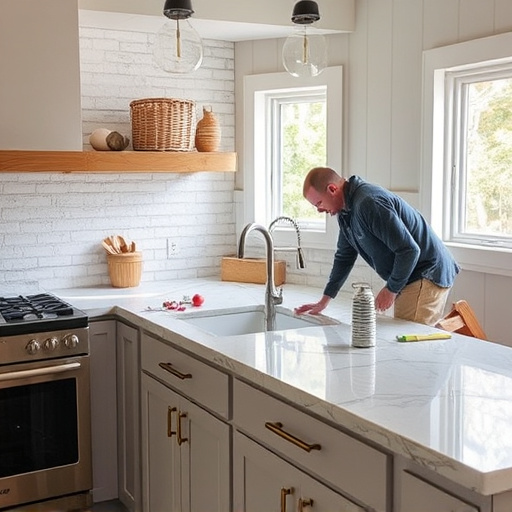Understanding local permit requirements is crucial for a successful countertop install project. Building departments issue permits ensuring safety and code compliance for structural integrity, material safety, and accessibility. Permits may be needed for demolition, new construction, or specific trades. For multi-room remodels, coordinating with various departments and obtaining separate permits per space avoids delays and legal issues. Adhering to codes ensures a safe, functional space with proper material fire resistance, drainage, and accessibility considerations. Consulting professionals guarantees compliance, enhances quality, and extends the lifespan of your countertop install.
Planning a countertop install? Navigating permits and codes can seem daunting, but understanding these regulations is crucial for a smooth project and ensuring safety. This guide breaks down everything you need to know about permits and codes related to countertop installation. From understanding local requirements to selecting the right materials, we’ll walk you through each step, ensuring your project complies with essential standards and stays within legal boundaries.
- Understanding Permits for Countertop Installation
- Essential Codes for Safe and Legal Countertop Work
- Common Permit Requirements for Different Countertop Materials
Understanding Permits for Countertop Installation

When undertaking a countertop install project, whether it’s part of a whole house remodel or a focused floor replacement in one room, understanding the permit requirements is paramount. Permits serve as official approvals from local building departments, ensuring that your project complies with safety and construction codes. These regulations cover various aspects, including structural integrity, material safety, and accessibility standards. Depending on your location and project scope, you might need permits for demolition, new construction, or specific trades like plumbing or electrical work, all of which are integral to a successful countertop install.
For homeowners embarking on a multiple room remodel that includes countertops, it’s crucial to grasp the permitting process in each affected area. This may involve coordinating with different departments and potentially obtaining separate permits for each space. Staying informed about these requirements ensures your project stays compliant, avoids delays, and helps you avoid any legal complications that could arise from non-compliance during a whole house remodel or floor replacement.
Essential Codes for Safe and Legal Countertop Work

When undertaking a countertop install project, whether it’s for a kitchen remodel or whole house makes over, adhering to essential codes and regulations is paramount. These guidelines aren’t just about compliance; they’re designed to ensure safety and structural integrity. For instance, many areas require permits for countertop installations to comply with building codes that address factors like load-bearing capacity, electrical wiring for new fixtures, and safe gas line connections if applicable.
Knowing which specific codes apply to your location is crucial, as they can vary significantly from one region to the next. Some key standards to be aware of include those related to materials used (like fire resistance ratings), proper drainage systems for surfaces, and accessibility considerations, especially in home remodeling projects. Following these codes not only protects the integrity of your project but also safeguards against potential hazards and ensures a functional space that meets both aesthetic and safety requirements.
Common Permit Requirements for Different Countertop Materials

When embarking on a countertop install project, understanding the common permit requirements for different materials is crucial. Depending on your chosen material—whether it’s granite, quartz, or wood—there may be specific codes and regulations that need to be followed. For instance, natural stone countertops like granite often require permits due to their potential weight and the specialized installation techniques involved. Conversely, laminate countertops typically have less stringent requirements as they are lighter and easier to install.
In the realm of home improvement services, kitchen remodel projects involving countertop replacements or installations in multiple room remodels must adhere to local building codes. These codes dictate everything from material safety to structural integrity and water supply connections. Therefore, it’s essential to consult with professionals who can guide you through the permit process and ensure your project complies with all relevant regulations, enhancing the overall quality and longevity of your countertop install.
When undertaking a countertop install project, navigating permits and codes is essential for ensuring safety, legality, and a smooth process. Understanding the specific requirements for your area and material choices is key. By familiarizing yourself with permits for countertop installation and adhering to relevant codes, you can avoid delays, penalties, and potential hazards. This guide has provided an overview of these crucial steps, offering insights into permit types, necessary codes, and common requirements for various countertop materials. Remember, proper preparation is the cornerstone of any successful DIY or professional countertop install endeavor.














